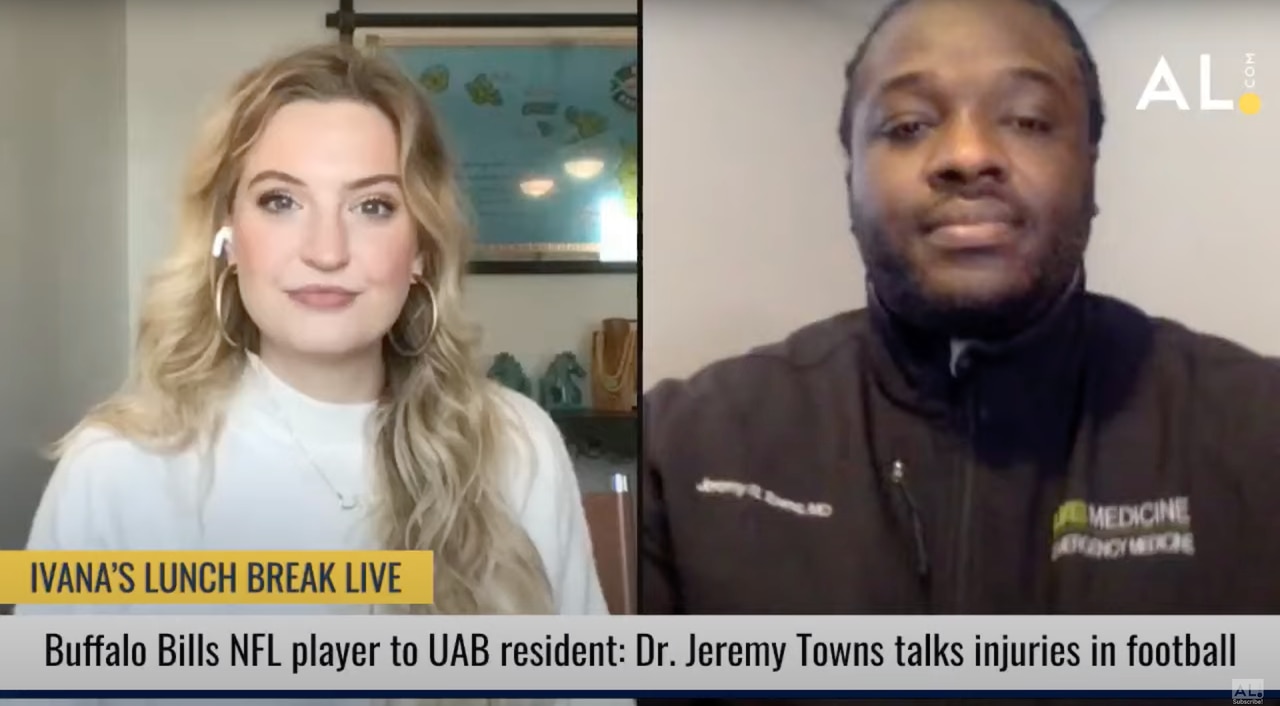UAB doctor, former Buffalo Bills DL, on Damar Hamlin injury and concerns with injuries outside NFL
A former NFL player and resident at UAB Hospital said the NFL’s high-profile injuries, like Damar Hamlin’s, shouldn’t be the only ones people are concerned about.
Dr. Jeremy Towns, who played for several years in the NFL for Washington, the Buffalo Bills and the Philadelphia Eagles, is completing his medical residency at UAB’s emergency department and has plans of a career in sports medicine.
While Towns said he doesn’t get too much time to watch football games on TV, he was immediately concerned when he heard about the Buffalo Bills’ safety Damar Hamlin’s cardiac arrest during Monday Night Football.
Towns’ wasn’t watching when Hamlin collapsed on the field last week, but he quickly received a string of text messages and links to the video of the 24-year-old’s medical episode.
“Anytime you see someone whose experienced cardiac arrest, you never know, because you can get a pulse back and the patient can… survive in the hospital for a certain period of time. But you always worry about neurological recovery, meaning that did the brain receive blood fast enough or quickly enough while they were down?”
Towns added, “I was always hoping for the best, but the physician side of me was always speculating. But then the other side of it too is that this is a young, healthy, elite athlete… so you figure that if anyone could have a positive outcome, it would be a guy such as Damar Hamlin.”
During his time playing football in high school and at Samford University, Towns said he didn’t think about his position on the defensive line as being one that could end his life. Towns was in the school’s sports medicine program, and said concussions and CTE were just starting to be discussed more widely.
“So it made me start thinking about these sub-concussive impacts where it’s not a concussion, but you know, it’s cumulative over time when you keep hitting your head against an opponent. But you know, that would be something that would happen over time. As far as seeing something that acutely happens, where you’re putting your life on the line, I never thought about that,” he said.
“I never thought about my heart stopping. I really never thought about passing out on the field. I never thought about being paralyzed or any of that nature. You know, if anything I thought about these injuries that I’m sustaining, would they catch up with me down the road, but never thinking that I would possibly lose my life on the field.”
Towns also said more attention needs to be paid to the injuries being sustained outside of the NFL.
“The NFL does get a bad rap. What scares me more than anything is that the NFL is high profile. It’s under a microscope. But what about all these players who’ve played since they were four and five years old, and they matriculate through college and they’ve played, they don’t make it to the NFL? Those are the people I’m sometimes more worried about.”
When asked if young children should play the sport, Towns said there are ways for it to be played safely. “It’s a polarized topic of whether kids should be playing football or not. I would argue at a young age it’s probably best for a kid to be playing flag football,” he said, before transitioning into full-contact football.
“I realized that sports aren’t life. There’s so much, so many things bigger than life,” Towns said. “I like how sports can bring people from all classes, religions, ethnicities together, for one goal and to cheer on their teams. I love that aspect of it. So I’ll always like those positive aspects of sports, but it’s kind of like we have to realize like at what point are we putting too much weight on sports? Because what I’ve also seen is that a lot of people don’t get a chance to play NFL and so sometimes they can feel like it was all a waste.”
“But sports was supposed to teach us character. It was supposed to teach us work ethic. It was supposed to teach us how to not give up and perseverance and that type of thing. So it’s a lot of other intangibles that sports delivers that you really can’t get unless you play organized team sports.”
